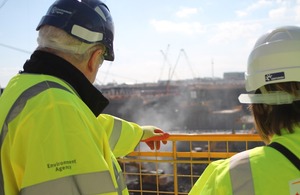Variation to Hinkley Point C operational water discharge activity
Variation issued today to an environmental permit for Hinkley Point C nuclear power station, to allow for a change in water discharge activity at the site.

EDF - Hinkley Point C
- Changes to the current permit to allow the discharge of seawater through a fish recovery and return (FRR) system.
- Sets compliance limits on the discharge from the FRR system.
- Removes all references and conditions (or parts of conditions) relating to use of the proposed acoustic fish deterrent (AFD) system, as an AFD system is not required to reduce the water quality pollution risk from HPC’s fish recovery and return (FRR) system discharge.
The Environment Agency has today issued a variation to an environmental permit (EPR/HP3228XT) for Hinkley Point C (HPC) nuclear power station, to allow for a change in water discharge activity at the site.
The original permit variation, regulates the operational water discharge activities from HPC – these are discharges of non-radioactive liquid effluents:
- returned cooling water from the turbine condensers
- trade process effluents from the various plant systems (including those that maintain water purity and chemistry to keep the best operating conditions and maximise efficiency)
- treated sewage effluent (from staff welfare facilities)
The varied water discharge activity permit we have issued today will now additionally regulate the discharge of seawater through a FRR system.
As a result of our assessment on the impact of the FRR system discharge, we have included compliance limits on the volume, rate and total biomass discharged from the FRR system’s outlet.
We have:
- removed all references and conditions (or parts of conditions) relating to the proposed acoustic fish deterrent (AFD) system.
- concluded that there would be no adverse effect on the integrity of the relevant European designated sites (in relation to pollution from regulated discharges to waters) if there is no AFD system in place. This includes those sites functionally linked to the Severn Estuary. The discharges will not result in the condition of relevant SSSIs deteriorating or prevent them from improving or recovering.
- also concluded that the permit variation will not cause the current status of the water bodies to deteriorate or prevent them from achieving their objectives.
The varied water discharge activity permit also includes the requirement to use an additional operating technique and an improvement condition. It also includes two pre-operational conditions which need Environment Agency approval before the proposed power station can be commissioned or begin to operate. These are included to make sure that NNB Generation Company (Hinkley Point C) Limited builds and operates the proposed power station according to the commitments made in its permit variation application.
The Environment Agency’s Hinkley Point C Project Manager Simon Barlow said “This is the final stage of our process to determine a change requested by the operator for its water discharge activities at Hinkley C nuclear power station. We have decided to grant the permit variation but have added new limits and conditions in the permit to protect people and the environment.”
Change to permit follows public consultations
The decision follows two rounds of public consultation - on the application from 24 January to 2 March 2023 and on the proposed decision and draft permit from 25 April to 25 May 2023.
A summary of topics raised, information about which organisations responded and how we considered all relevant issues is included in our final decision document.
We are grateful to everyone who took the time to respond to the consultations and attend online consultation meetings.
The decision documents, a public summary and permits are available at Hinkley Point C: water discharge activity permit variation - GOV.UK (www.gov.uk)
Background information
The Environment Agency is the independent environmental regulator for the nuclear industry in England. We make sure that nuclear power stations meet high standards of environmental protection.
The Environment Agency regulates specific environmental matters at nuclear sites in England by issuing environmental permits. These permits cover site preparation, construction, operation and decommissioning.
As well as regulating the site, through these environmental permits, the Environment Agency also provides advice and information to the Planning Inspectorate, including the protection of water quality and ecology, and flood and coastal risk management.
EDF’s company NNB Generation Company (Hinkley Point C) Ltd is building a new, twin reactor nuclear power station at the Hinkley site in west Somerset. Operation of the first reactor is expected in 2027.